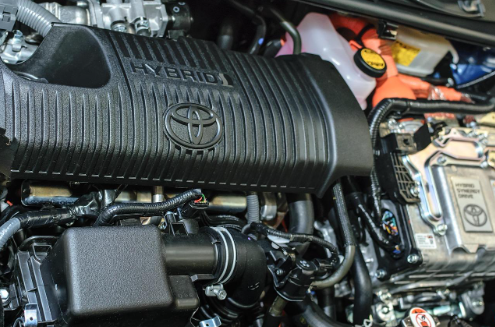Your Toyota hybrid represents a wise investment in both eco-friendly driving and cutting-edge automotive technology. These vehicles pair traditional combustion engines with electric motors and lithium-ion batteries, creating a setup that needs special care. Taking good care of your hybrid system keeps it running smoothly, saves you money at the pump, and helps avoid repairs. Our Kirksville Motor Company service team has put together this guide to demystify hybrid charging and maintenance.
Essential Toyota Hybrid Battery Maintenance Tips
Taking care of your hybrid battery isn't difficult, but it does require some knowledge. Most carmakers recommend charging to about 80% to 90% daily, rather than fully charging to 100%. This helps maintain battery chemistry within the optimal range and extends its life span. The optimal battery charging levels are between 20% and 80%, providing a sufficient driving range.
Your car can reach 100% without worry with at-home AC charging (Levels 1 and 2), as the system automatically cuts off at 100%. However, when using roadside DC fast chargers (Level 3), stick to 80% and try not to exceed three charging sessions per day.
Heat and cold are hard on your battery. Hot weather accelerates the chemical breakdown inside the battery cells, reducing capacity and shortening its service life. Cold makes the battery's chemistry sluggish and decreases your driving range. According to the National Renewable Energy Laboratory, today's electric vehicle (EV) batteries last 12 to 15 years in mild weather but only eight to 12 years in places with extreme temperatures.
Smart charging habits will save you money and keep your battery healthy longer. Fast charging can be expensive, costing three to four times more per kWh than home charging. Keep the battery at around 50% charge if you're storing your car, and avoid letting it sit unused for weeks. Drive it occasionally; even short trips around Kirksville help maintain the battery.
Toyota Hybrid Maintenance Schedule
Toyota hybrids have a regular maintenance schedule. Your first checkup should occur at 3,000 miles, then again at 6,000 and 12,000 miles to monitor hybrid-specific components. Luckily, new Toyotas come with ToyotaCare, which includes free maintenance and 24-hour roadside assistance that covers most early service needs. Change the oil and filters every 10,000 miles.
Your Toyota hybrid has an air filter that traditional combustion engines don't have; it's called a hybrid battery cooling air filter. All three filters should be changed every 30,000 miles; however, if you drive in dusty areas, they may need changing more frequently.
Brakes on a hybrid vehicle are very long-lasting, thanks to regenerative braking. Some owners report that their original brake pads are still working fine at 100,000 miles. However, you may want to change the brake fluid every three years and lubricate the calipers yearly.
Engine coolant, transmission fluid, power steering fluid, washer fluid, and brake fluid all need checking and topping off. The cooling system requires extra attention, as it keeps both the engine and electrical components from overheating. Check the hoses and coolant levels regularly, and have a certified mechanic in Kirksville inspect the electrical system and battery connections at least twice a year.
Advanced Toyota Maintenance Considerations
Spotting battery problems early can save you a significant amount of money. Be alert to decreased gas mileage and sluggish acceleration, as these often indicate a fading battery. If levels fluctuate while you're charging, the car doesn't maintain a full charge while driving, or the gasoline engine kicks in more than usual, something is probably wrong. Never ignore dashboard warnings and check engine lights; they're your best early warning system.
Hybrid cars' tires need special attention. They wear out about 20% faster than gasoline-powered cars, since hybrids typically weigh 20% more than similar gasoline vehicles. Your hybrid's electric motors deliver full power instantly, and heavy-footed driving can spin tires and wear them down quickly. There are specially designed EV tires that last 5% to 20% longer than regular tires; they're built with tougher sidewalls and different compounds.
Hybrids cost less to maintain than traditional cars because their engines work less due to sharing the load with the electric motor. Average drivers spend about $1,137 yearly on fuel for hybrids versus $2,425 for gasoline-powered cars, but that's without factoring in the cost of electricity. We also recommend using Toyota's original equipment manufacturer parts, which ensure that everything fits perfectly and works right.

Leveraging Professional Toyota Maintenance and Services
Toyota dealers have sophisticated computer tools that your local garage may not have access to. Toyota Techstream is Toyota's diagnostic software that reads error codes, monitors live data, programs computers, and checks your car's health. Toyota dealership service departments also have advanced diagnostics and programming abilities that cheap scanners can't match.
Warranties are important. Starting with the 2020 models, Toyota increased its hybrid battery coverage from eight years/100,000 miles to 10 years/150,000 miles. Other hybrid parts, such as battery controllers, hybrid control modules, and inverters, are covered for eight years or 100,000 miles, whichever comes first. Even Toyota's Gold Certified Used cars come with protection: 12 months/12,000 miles of bumper-to-bumper coverage plus seven years/100,000 miles of coverage on powertrain parts.
Your warranty is worth protecting, and certain actions can void it. Poor maintenance tops the list, followed by ignoring Toyota's care suggestions and using the wrong fluids. Similarly, using your vehicle for a purpose it wasn't intended for — such as off-roading with a sedan — can also void coverage. Adair County's certified Toyota technicians are familiar with these restrictions and can help you maintain your warranty in good standing.
Protect Your Toyota Vehicle Investment With Professional Toyota Hybrid Care
Following Toyota's recommendations protects your investment. Hybrid technology combines traditional gas-powered car parts with high-tech electrical systems. Using genuine Toyota parts ensures everything runs smoothly and protects your warranty. Well-kept hybrids also sell for more when it's time for something new, not to mention giving you years of trouble-free driving.
Tailored maintenance makes all the difference. Northeast Missouri experiences hot, humid summers and cold, snowy winters. Regular driving on U.S. Highway 63 can also take a toll, but our certified Toyota technicians in Kirksville can adjust service timing according to our location and your driving habits. Regular battery health checks, software updates, and system tests help maintain peak efficiency.
Schedule Your Toyota Hybrid's Service at Kirksville Motor Company Today
Don't trust your hybrid to just anyone. Book your next service with people who know Toyota hybrid systems front to back. Our Kirksville Motor Company certified technicians have the right tools, genuine parts, and expertise to keep your hybrid running smoothly for years. Give us a call today to talk about what your Toyota hybrid needs to stay in optimum condition.
Hybrid Car Toyota by ASPhotohrapy is licensed with Pixabay License



